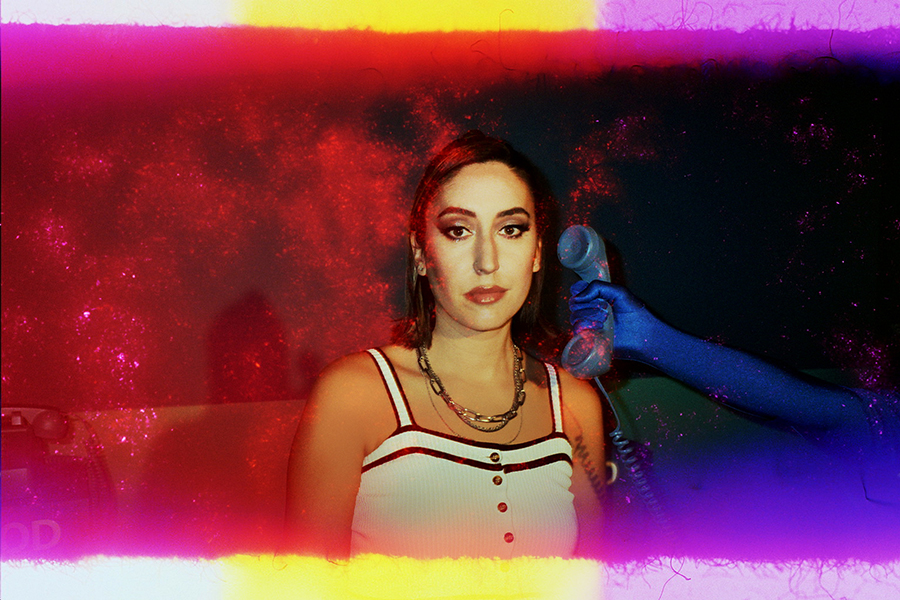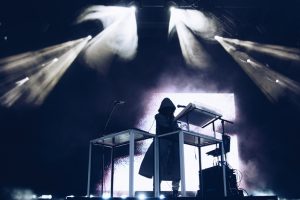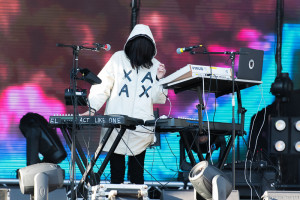INTERVIEW: Elohim finds solid ground amid pandemic chaos

Elohim, courtesy: Chase O’Black.
Elohim presumed she had averted a personal tragedy on March 3. A couple of weeks into a headlining tour, she and her band were hours from loading in their gear at Basement East in Nashville when the entire concert hall was destroyed by a tornado.
The electronic music singer-songwriter, who struck gold with her own alt-radio collaborations with the likes of Louis the Child, Marshmello, Skrillex and The Glitch Mob, remembers the day leading up to the disaster, still. First, at breakfast, her creative director told her one of their good friends had died. That night, when the wind began to howl and the storm arrived, she’d entertained the option it was the friend speaking to her. The thunder and lightning were like nothing she’d ever seen. Sirens rang out.
“You would look at the window, and it looked like somebody was holding a hose on the window, shooting water,” she said in a recent video call from her home in Los Angeles, nine months into a pandemic that would end up canceling her tour just a week after the tornado. Still, she fell asleep that night, and woke up to news of the destruction just two streets away from where she was staying with a friend.
“The tour would have been cancelled if our gear had been there. Or what if we were there?” Elohim said, explaining how her crew played out the what-ifs as they left town, thinking the tour would go back to “normal.” “That time was buried by COVID just a week later and shutting everything down.”
Fast-forward to late November, and the artist is still at home, which she shares with her creative director. Her brother lives a couple of minutes away; her parents, 10 minutes. She’s picked up playing tennis—“I’ve been playing so much tennis; my shoulder is feeling crazy. Epsom salt baths have been amazing.”
She’s curated her own personal “quarantine gallery,” a collection of framed mementos from tour, art prints, and her own decorated steer skulls and deer antlers, which all take up wall space. There’s a page of sheet music from Chopin’s “Revolutionary Étude (Op. 10, No. 12) in C Minor.” She mimics the fast-descending melody as she describes it. There’s a postcard-sized print of a painting by Amedeo Modigliani, who’s one of her favorites. There’s some beautiful poster-sized fan art for her song “Braindead.” And then there’s a type-written poem that a Berkeley street artist created for Elohim on the spot around 2016.
Then there’s her piano, which Elohim’s dad bought for her when she was 10 and progressing in her studies of classical music. It’s the same piano she played at a live show in 2019 at Hollywood Forever Cemetery that was turned into a live album.
“I’ve been making a lot of music, actually, which has been really nice,” said Elohim, who keeps her birthname to herself. “It’s been different, because I’ve been forced to make music alone in my house, and I think it brings out a really special side of me. … Right now feels like the time before I ever put out music, when it was just me in the studio every day, creating whatever I wanted.”
She’s battled mental health demons since she was 7—and in fact, her preference to keep her name, and before, even her image (she covered her face with a mask or her bangs) to herself was an attempt to stay within herself. But, truth be told, she’s doing better health-wise at home than on the road.
Much of the anxiety and dissociation she’s faced since becoming a performer was brought on by being in crowds, whether that’s on stage or in airports, because of touring.
“I’ve had to work really, really hard to be able to get to a point where I can… tour and be around people all the time,” she said. “And then, that’s just gone.”
Elohim acknowledges that she still has sad days, and sometimes still becomes depressed, but these days, what’s causing the most anxiety is returning to her office—a not uncommon worry. But while we worry if we will fit into our pants when the time comes, she worries about being able to perform in front of people.
“They’re saying touring isn’t going to be back until next summer,” she said. “It’s crazy to think about how my body, and how’s my mind’s going to react once shows and traveling and being around people are all of a sudden back. Will I just snap back into it, or am I going to have this crazy episode and freak out? I don’t know. … You can kind of just like hide in your bed when you’re scared; whereas, if you’re at a festival, you can’t do that.”
During this conversation, Elohim shows her outgoing side. She seems excited to speak about what’s been going on in her life, and she’s got her hair up. But until about a year ago, she rarely shared her speaking voice or even her face.
“It was kind of like this security blanket, and it worked well for me,” she said.
Anxiety and fear ruled her life everywhere to the point she got sick every month. Then, in 2017, she became really ill. She had pneumonia and spent two months in bed. She was down to 100 pounds (she’s up to a healthy weight now) and decided she had to get help from a psychiatrist. That’s when she got a prescription for medication, which has been helping her. She hasn’t gotten sick since, she said.
“It’s interesting how your mind really does affect your body and your health,” she said.
From that moment on she felt like she had a story to tell, and she got the chance in a corporate partnership with a tech company and a commercial. She’d been offered the opportunity to cover her face and mask her own voice with a robotic one (as she usually did) but made the decision to appear and speak herself.
Her first on-camera appearance felt empowering, she said.
Much of Elohim’s music tackles subjects related to her mental health: her struggles and breakthroughs and everything in between. She even donated a portion of sales from her 2019 EP, Braindead, to mental health initiatives and has gotten involved with the JED Foundation, a suicide prevention organization.
In October, she released “Good Day Bad Day,” a single from her forthcoming album that preaches hope, as nothing lasts forever. It’s a song that perfectly suits a pandemic, when telling time is becoming more difficult than ever and all days roll into one big mass. Elohim wrote the song shortly before kicking off her stricken tour, before coronavirus entered the lexicon.
Elohim on recreating her electronic tracks for a 2019 symphonic concert and album
Elohim writes her songs on a synth or a computer rather than at the piano. So for 2019’s Reimagined: Live at Hollywood Forever, the classically trained pianist had to deconstruct her music and build it back up as piano and strings arrangements.
“That whole acoustic experience, which was such a challenge. Maybe the most work ever on any show because I had to relearn every song and rearrange every song. We literally have sheet music for all of it because it was so much to digest. I was taking these electronic songs that I wrote with synthesizers and electronic instruments; making that suddenly acoustic, which was really beautiful. … I was like, ‘I want to do a whole tour.’ It was so cool. It was such a different experience. It was emotional and it was just so one-on-one with the audience, which was amazing. … I was less nervous, too. I thought I would have been way more nervous. … It’s not like a whole lot of electronic stuff going on. There’s not a ton that could go wrong, I guess. You could just fuck up on a piano or something. I would 150-percent want to do that again.”
She said she decided to release the song after speaking to fans—Elohim is known for her approachability—and realizing a common thread of many people suffering from anxiety, panic attacks and depression for the first time in their lives.
“It’s interesting to see people who maybe didn’t understand it before kind of start to sort of have more empathy toward it,” she said. “It’s interesting how so many people can relate to the song now that I wrote before because I’ve always felt this way. … This song just rings so true right now. The chorus feels fun and it has a nice message, but the verses, I would say, are really deep. I think more people can understand them and feel comforted by them now, in this time.”
She said mental health will always be an underlying theme in her music, but that along with the lows, there are also highs to write about as well. Writing truthfully about her life comes easy to her, she said.
“It just feels the most authentic because I’m constantly living that and constantly, my brain is just spinning out thinking about life and death and everything in between,” she said. “It’s hard for one human to understand it. I don’t think we ever will. I feel like I’m just constantly trying to grasp any understanding of life, and I put that into a song.”
She’s been tinkering with her finished album, which she presumed she’d release last summer around festival season. When it’s finally out, it’s likely to be different than where it was in March because she’s in a different place now. But fans of her robotic voice that she’s used on records and at shows need not fear. She’s grown attached to “her,” and she’s not going anywhere.
In the meantime, she’s been working on both the technical and artistic side of herself—filming videos, music production and engineering—and her altruistic side by learning to cope better with her anxiety and being a better person.
Elohim has her moments of sulking on the couch, but she’s also grateful for what she still has in her life.
“I didn’t expect to be slowing down and reflecting right now because I expected 2020 to be like, ‘Let’s go!’” she said.
Follow editor Roman Gokhman at Twitter.com/RomiTheWriter.



